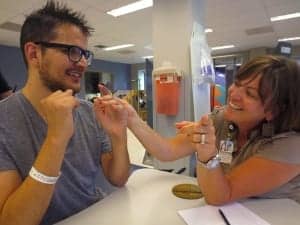Sports and recreation-related concussions impact an estimated 1.6 to 3.8 million people nationwide annually, according to the Centers for Disease Control and Prevention.
A concussion is a type of traumatic brain injury (TBI) caused by a blow or jolt to the head and can range from mild to severe, and it is important to note that even if you do not lose consciousness after a fall, it is possible to have a concussion.
Symptoms of concussion can include headache, nausea, dizziness, and visual changes, but it is important to note they are different for every individual and are not always immediately evident. It can take days or weeks before symptoms are present, so it is important to seek medical attention immediately following any type of blow to the head.
“Recovery from concussion and brain injury never really stops, so even if an injury occurred in the past, it is not too late to seek medical advice,” says Patrick Walsh, PsyD, director of psychology and Brain Injury Program coordinator at Marianjoy Rehabilitation Hospital, Wheaton, Ill. “It can be a very slow process and usually requires long-term rehabilitation.”
March is National Brain Injury Awareness Month; this year the focus is on sports and concussions. It is important to wear protective gear—including a helmet—when engaging in physical activities such as snowboarding, skiing, bicycling, rollerblading, or contact sports.
Marianjoy has received full accreditation from the Council for Accreditation of Rehabilitation Facilities (CARF) for its inpatient brain injury program, and its staff helps improve the outcomes of patients with brain injury by addressing their physical, cognitive, emotional, and behavioral challenges. The Brain Injury Team works with the patient to optimize the patient’s life skills that are necessary to transition home and integrate back into the community.
In addition to offering an acute inpatient brain injury program, the Marianjoy Post Concussive Institute Program offers treatment for those experiencing physical, cognitive, or emotional difficulties following a mild head injury.
[Source: Marianjoy Rehabilitation Hospital]




